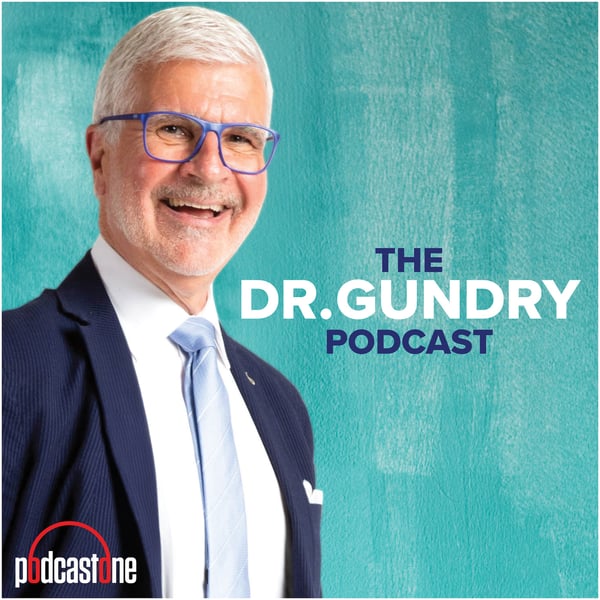3 WORST Fasting Trends to Avoid (and best drinks for a healthy oral microbiome) | Ep208
The Dr. Gundry Podcast
PodcastOne
4.6 • 1.7K Ratings
🗓️ 21 June 2022
⏱️ 42 minutes
🧾️ Download transcript
Summary
Transcript
Click on a timestamp to play from that location
| 0:00.0 | Welcome to the Dr. Gundry Podcast. The weekly podcast where Dr. G gives you the tools you need to boost your health and live your healthiest life. |
| 0:13.5 | Welcome to the Dr. Gundry Podcast. I'm back with another info pack mashup episode where I cover some of your most requested topics. |
| 0:24.0 | This episode features bite-sized lessons where I share life-changing tips to help you live your longest healthiest life. So, stay tuned. We'll be right back. |
| 0:37.0 | Let's talk about the three worst fasting trends. All right, fasting is the health trend to journal doubt. And that's why there's a lot of misinformation out there about this ancient health practice. |
| 0:50.0 | And a cornerstone of almost every religion to achieve enlightenment. Everyone is talking about it, but not everyone knows the dangerous side effects if you don't fast correctly. |
| 1:03.0 | Now, don't get me wrong. Fasting is one of the keys to longevity and vitality. But you need to know how to do it properly in order to reap the maximum benefits. |
| 1:16.0 | So, today I'm going to address the top three fasting trends to avoid at all costs and what you can do instead. |
| 1:25.0 | All right, number one, cutting your window of eating too drastically. Now, if you read any of my books, my favorite way to fast is intermittent fasting or time-controlled eating. |
| 1:38.0 | Now, that basically says that we're going to shorten the period of time during the day that we consume our food. That's intermittent fasting. |
| 1:51.0 | Time-controlled eating means we shorten that window, preferably down to about six to eight hours a day. Now, as I talk about a lot and unlocking the keto code, unfortunately, if you're eating used eating, |
| 2:07.0 | 12 to 16 hours every day, and the average American believe it or not eats 16 hours a day, literally from the minute they get up to the minute they go to bed. |
| 2:22.0 | And as I show in my last two books, most of us are insulin resistant and metabolically inflexible. That means when you stop eating normally, |
| 2:34.0 | you should be able to instead of using glucose as a fuel sugar, use free fatty acids fat as a fuel. But the vast majority of us can't do that. |
| 2:47.0 | And when we stop eating within a few hours, our glucose stores fall dramatically. That could be compensated by using fat as a fuel, but most of us can't use fat as a fuel. |
| 3:01.0 | So we crash, we get headache, we get grouchy, we get dizzy, we get worse, and that's why so many people fail at time restricted eating. |
| 3:16.0 | Now, as I talk about in my last few books, what I want you to do if you want to do this is gradually decrease the amount of time that you eat your food. |
| 3:28.0 | So, for instance, if you eat breakfast at 7 o'clock in the morning, this next week let's eat breakfast at 8 o'clock in the morning. I just want you to wait one more hour. |
| 3:39.0 | Accomplish that, take the weekend off, the next week will do 9 o'clock in the morning. That's just one more hour. |
| 3:46.0 | Gradually work your way out to about a six-day-hour eating window. That means eat breakfast at 11 o'clock in the morning, finish dinner at 7 o'clock at night. |
| 3:58.0 | And eat our window. Want to compress it to 6? Eat breakfast at noon, finish dinner at 6 o'clock. |
| 4:07.0 | Fantastic health benefits, but you don't jump off a 10-story building to do that. I've seen it fail so many times, just avoid that at all costs. |
| 4:18.0 | Alright, how about a prolonged water fast? Now of course this is the most well-known historically speaking approach to fasting. |
... |
Please login to see the full transcript.
Disclaimer: The podcast and artwork embedded on this page are from PodcastOne, and are the property of its owner and not affiliated with or endorsed by Tapesearch.
Generated transcripts are the property of PodcastOne and are distributed freely under the Fair Use doctrine. Transcripts generated by Tapesearch are not guaranteed to be accurate.
Copyright © Tapesearch 2025.

